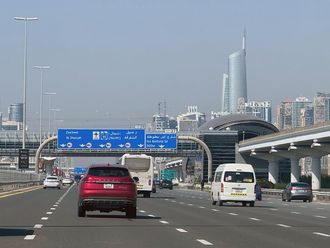
Dubai: If you are stuck in traffic due to heavy rains, dense fog or other extreme weather conditions, and are worried that you are late to work, there is some good news. As per a decree issued by the Ministry of Human Resources and Emiratisation (MOHRE), such delays in commute would be considered within working hours.
The conditions that need to be met for a worker's time to be considered within working hours were outlined in Cabinet Resolution No. (1) Of 2022, issued by MOHRE.
Article 15 of the Cabinet Resolution looks at how working hours are defined and how delays due to various reasons may or may not be considered as part of an employee's work hours.
1. The periods spent by the worker commuting between his place of residence and the workplace shall be counted within the working hours in the following cases:
a. Any delay to the worker in transit in case of bad weather and in response to the warnings of the National Centre of Meteorology regarding weather changes and fluctuations.
b. Any delay of the worker in transit in employer-provided transportation in the event of a traffic accident or an emergency breakdown.
c. If the parties expressly agree thereon in the contract.
When does a commute to work count as working hours?
The first clause of Article 15 stipulates that the periods spent by the worker commuting between his place of residence and the workplace shall be counted within the working hours in the certain cases.
Hari Wadhwana, a Dubai-based lawyer, explained it further.
“Article 17 (3) of Federal Law No. 33 of 2021 sets out that travel time between an employee's residence and office is not to be counted for the purpose of working hours. However, the said Article [in the Cabinet Resolution] sets out exceptions to this rule,” said Wadhwana.
The travel time between an employee’s residence and office will be counted within the working hours in the following cases, as stated by Wadhwana:
1. The time spent travelling between residence and office during bad weather and announcements made by the National Centre of Meteorology. For example, rains, sandstorms, floods, etc.
2. The time spent by the employee in company-provided transport during traffic accidents or emergency car breakdown - this is applied when the employer provides travel arrangements for employees and the said travel is impacted by traffic or breakdown of vehicle. In this case, the time spent in traffic or remedying the breakdown will be counted towards the daily working hours of the employee.
3. If the employee and employer agree to include travel time in the working hours - this reaffirms the principle that the parties are free to contract on their terms of engagement.
Wadhwana advised that some workers may consider negotiating with their employer on how their travel time may be calculated.
“For individuals working in sales or having jobs that require longer travel time, it is suggested to negotiate with the employers that this time incurred be included in the working hours,” he said.

For individuals working in sales or having jobs that require longer travel time, it is suggested to negotiate with the employers that this time incurred be included in the working hours.
When does commute not get counted in working hours
Ibrahim Al Banna, CEO of Dubai-based law firm, Ibrahim Al Banna Advocates and Legal Consultants said that in case there is no agreement between an employee and employer regarding their travel time, there will be no exceptions.
Al Banna said: “As per sub-clause (c) of Clause (1) of Article 15 of the Cabinet Resolution, the time consumed by an employee from his or her place of residence to the place of work shall be taken into consideration only if there is an express agreement between the employer and the employee stating that this time shall be taken into consideration to determine the total amount of working hours.”

In the absence of an express agreement, the time consumed by an employee to commute from his or her place of residence to the place of work shall not be taken into consideration for the purpose of determining the total number of working hours.
He added: “In the absence of an express agreement, the time consumed by an employee to commute from his or her place of residence to the place of work shall not be taken into consideration for the purpose of determining the total number of working hours.”











